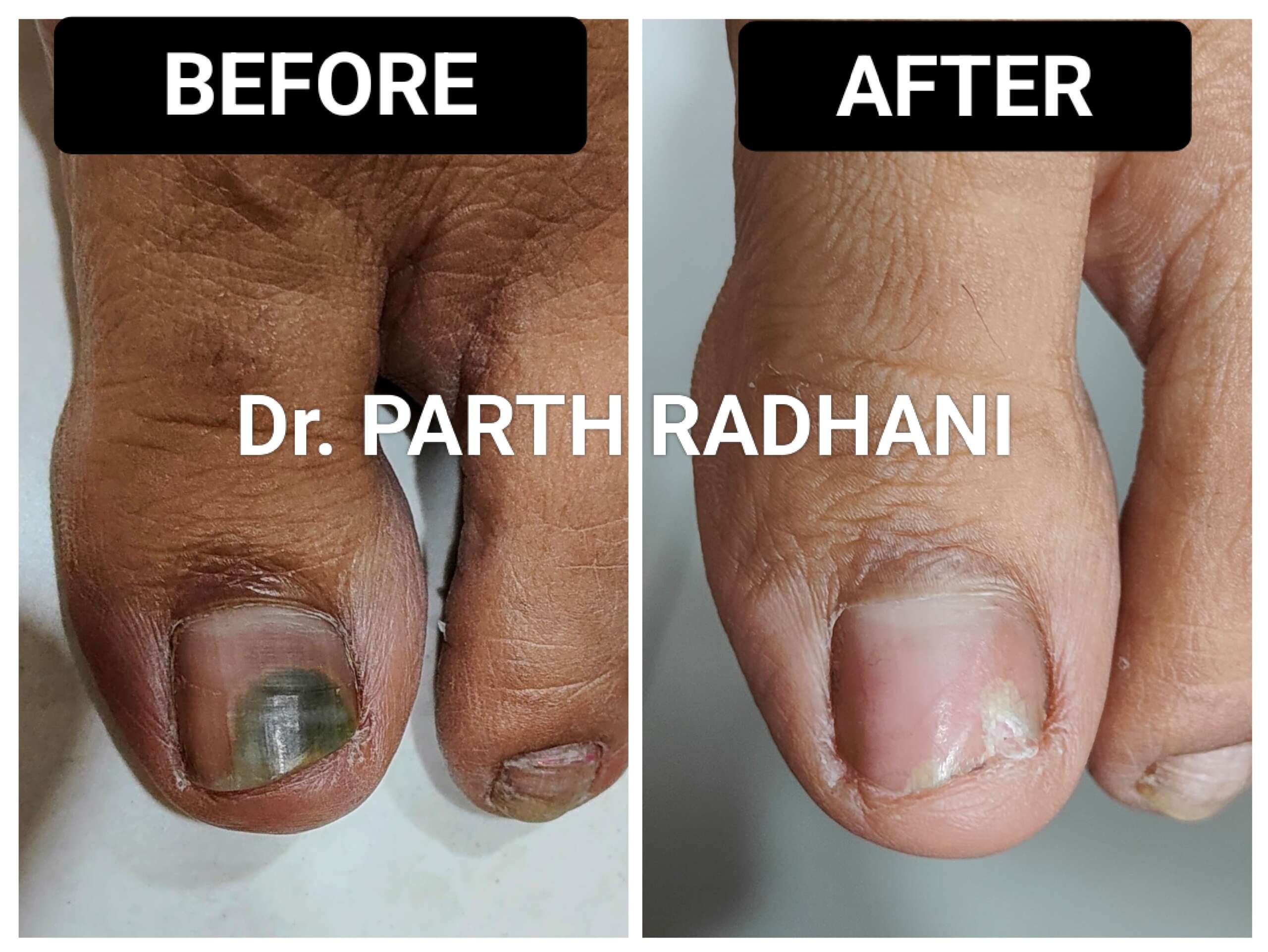Introduction to Onychomycosis
Onychomycosis, also known as a fungal nail infection, is one of the most common nail problems worldwide. It affects both fingernails and toenails, making nails thick, brittle, and discolored. While not life-threatening, it can cause pain, discomfort, and social embarrassment if left untreated.
At Cuticure Skin Clinic in Vadodara, Dr. Parth Radhani provides evidence-based treatment for nail fungus, ensuring both medical safety and long-term relief.
Causes of Onychomycosis
Fungal infections of the nails occur due to an overgrowth of fungi in, under, or on the nail. Several factors increase the risk:
Common Causes
Dermatophytes (Trichophyton species): The most frequent cause.
Yeasts (Candida): Common in fingernail infections.
Molds: Often affect toenails.
Risk Factors
Prolonged exposure to moisture (sweaty shoes, damp environments)
Poor foot hygiene
Diabetes and weakened immunity
Nail injuries
Age (common in the elderly)
Sharing nail clippers or footwear
Symptoms of Onychomycosis
Early detection helps in better treatment outcomes. Symptoms vary depending on the severity of the infection.
Common Symptoms
Nail discoloration (yellow, brown, or white spots)
Thickened nails
Brittle or crumbly nail surface
Foul odor from the affected nail
Pain or discomfort while walking
Nail separation from the nail bed (onycholysis)
Types of Onychomycosis
There are several forms of fungal nail infection:
Distal Subungual Onychomycosis
The most common type; infection starts at the nail edges and spreads inward.
White Superficial Onychomycosis
White patches form on the nail surface.
Proximal Subungual Onychomycosis
Infection starts near the cuticle and spreads outward.
Candida Onychomycosis
Mostly affects fingernails, particularly in people with frequent water exposure.
Diagnosis of Fungal Nail Infection
A proper diagnosis is essential for effective treatment.
Diagnostic Methods at Cuticure Skin Clinic
Physical Examination: Nail color, shape, and texture check.
Microscopy (KOH test): Detects fungal elements.
Fungal Culture: Identifies the exact fungus type.
Nail Biopsy (rare cases): For resistant infections.
Treatment of Onychomycosis
Treatment depends on the severity, type of fungus, and overall health condition.
At Cuticure Skin Clinic Vadodara, Dr. Parth Radhani combines modern dermatology with patient-friendly care.
Medical Treatments
Topical Antifungal Medications
Creams, nail lacquers, medicated gels.
Effective in mild infections.
Oral Antifungal Medicines
Prescribed for moderate to severe cases.
Common medicines: Terbinafine, Itraconazole, Fluconazole.
Combination Therapy: Both oral and topical medicines are used for resistant cases.
Non-Medical & Advanced Options
Laser Treatment: Helps destroy fungus under the nail.
Nail Debridement: Trimming or thinning infected nails.
Surgical Removal: For severe, painful infections.
Preventing Onychomycosis
Prevention is always better than treatment.
Tips to Reduce Risk
Keep nails clean and dry.
Wear breathable footwear.
Avoid walking barefoot in public places (pools, gyms).
Do not share nail clippers or footwear.
Regular check-ups at a Skin specialist clinic in Vadodara if prone to fungal infections.
Why Choose Cuticure Skin Clinic Vadodara?
Dr. Parth Radhani – Experienced Skin Specialist in Vadodara
Accurate diagnosis using the latest dermatology methods
Personalized treatment for nail fungal infection
Focus on long-term results, not just temporary relief
Clinic located in a central area of Vadodara for easy accessibility
Frequently Asked Questions (FAQs)
Is onychomycosis contagious?
Yes, it can spread through direct contact or contaminated objects like shoes, socks, or nail clippers.
Can a fungal nail infection go away on its own?
No, fungal infections usually worsen if left untreated. Professional treatment is required.
How long does treatment take?
Treatment may take 3–6 months for fingernails and up to 12 months for toenails.
Can home remedies cure onychomycosis?
Home remedies may provide temporary relief, but do not eliminate the fungus completely. Medical treatment is recommended.
Is laser treatment safe?
Yes, laser therapy is a safe and effective option for resistant fungal infections.
Final Thoughts
Onychomycosis is common but treatable. Ignoring it may lead to complications, pain, and the spread of infection. If you notice changes in your nails, consult a qualified Dermatologist.
For safe and effective treatment of fungal nail infection in Vadodara, Cuticure Skin Clinic by Dr. Parth Radhani provides professional care backed by expertise and t
For reliable pemphigus treatment in Vadodara, visit us today and consult Dr. Parth Radhani, one of the most trusted skin specialists in Vadodara.
Call Now: 09313324176


